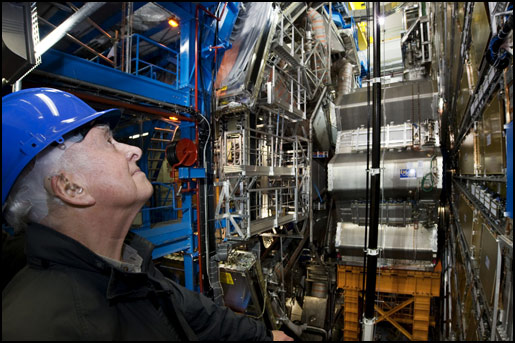
ATLAS e-News
23 February 2011
The first Higgs at ATLAS
21 April 2008

Peter Higgs visits the ATLAS detector
Several weeks ahead of switch-on, the ATLAS project has already glimpsed one Higgs. Peter Higgs, emeritus professor of physics at the University of Edinburgh and the man behind the Higgs boson, visited the LHC ahead of the Open Day.
It was the 78-year-old’s first visit to the LHC – he was last at CERN briefly in 1985 – and he was dazzled by the size of the project. “The sheer scale of the detectors is overwhelming - far more impressive than you imagine from any photograph,” he said aterwards at a press conference in the Geneva AIrport Hotel.
Peter Higgs also commented on the logistics of construction. “I think the building of it is really an impressive achievement,” he said. “The way they have managed to organise the manufacture of components from other countries all over the world and get them to fit together.”
When asked to compare the various detectors around the LHC, Higgs singled out ATLAS for special praise. “ATLAS is way ahead of the others in terms of public relations,” he said. “CMS were extremely impressive in terms of interaction, but they don’t seem to be reaching out as much in terms of publicity as the ATLAS team does.”
Peter Higgs is “staggered” to think that the quest for the Higgs boson is a major motivation behind the construction of the LHC. It represents a huge vindication for his work – he remembers that the Higgs mechanism was met with some scepticism when he first proposed the theory in the 1960s. “At the time I started this work it was an unfashionable thing to be interested in,” he said. “On this side of the Atlantic, the dominant interest was in using S-matrix theory.”
At the time, Peter Higgs was sharing his office with an S-matrix theorist, who spent a summer at CERN shortly after Peter published his initial paper. “He came back from CERN and said: ‘They didn’t see that what you were talking about had much to do with particle physics!’” Peter Higgs remembered. The news prompted him to add more detail to his follow-up paper, in which he first discussed the “scalar boson” – the particle that would later be named in his honour. “I thought if they don’t understand the relevance of the theory, I better mention a few consequences,” he said.
Higgs is 90% sure the LHC will discover that consequence – the Higgs boson – by May next year, in time for his 80th birthday. He has already thought about celebrations. "I shall open a bottle of something," he said. When pressed further on whether he would opt for whisky – the national drink in Scotland – or champagne, Higgs opted for champagne. “Drinking a bottle of whisky takes a little more time,” he said.
Who else would ever dream of being offered a boson for his or her 80th birthday present?
